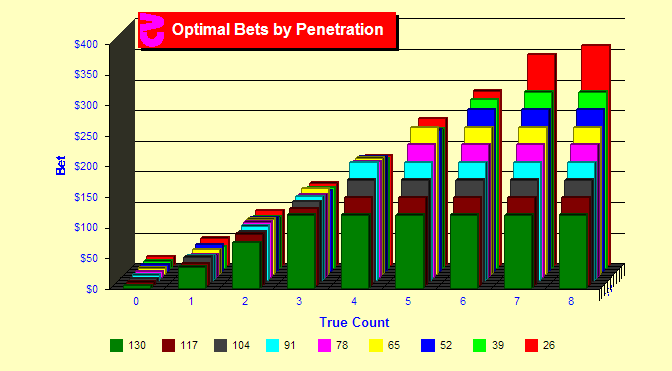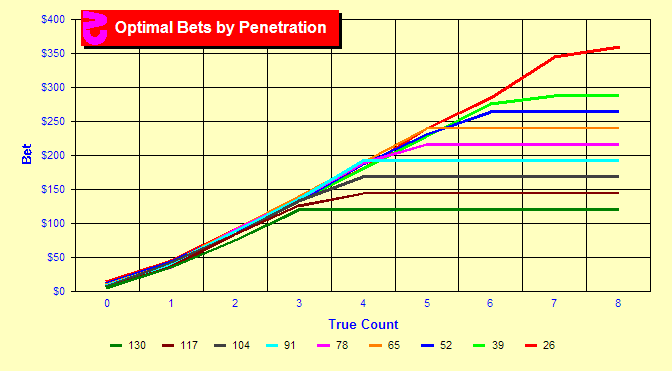by Norm Wattenberger
Chapter 9. Optimal Betting Data
| Optimal betting concepts have been around for quite a while, but
have come into better focus over the past several years. This chapter
contains some quick looks at optimal betting.
"He who knows that enough is enough will always have enough" — Lao Tzu | |
|
|
 The
optimal bets for nine penetrations are displayed. 26 cards to 130
cards cut off by half-deck increments. We start with the dark green
line — a very poor penetration of 130 cards (2.5 decks out of
6 cut off). Bets range from $5 to $120. The bets ramp up very quickly
with the max bet placed at a true count of +3. At TCs of 0 to +3 the
bets are $5, $35, $75, $120. As the penetration increases, we find
that the ramps can increase more gradually and the max bet is placed
at a higher and higher true count. Also, the dollar amounts increase.
The red line displays data for one half-deck cut off and the bets
range from $15 to $360, three times the size of the bets at the worst
penetration. The max bet is placed at a true count of +8. More typical
penetrations call for a max bet at TCs of +4 or +5 using Hi-Lo. The
optimal bets for nine penetrations are displayed. 26 cards to 130
cards cut off by half-deck increments. We start with the dark green
line — a very poor penetration of 130 cards (2.5 decks out of
6 cut off). Bets range from $5 to $120. The bets ramp up very quickly
with the max bet placed at a true count of +3. At TCs of 0 to +3 the
bets are $5, $35, $75, $120. As the penetration increases, we find
that the ramps can increase more gradually and the max bet is placed
at a higher and higher true count. Also, the dollar amounts increase.
The red line displays data for one half-deck cut off and the bets
range from $15 to $360, three times the size of the bets at the worst
penetration. The max bet is placed at a true count of +8. More typical
penetrations call for a max bet at TCs of +4 or +5 using Hi-Lo. |
|
Sim details
|
|
copyright © 2007, 2024, Norm Wattenberger, All rights reserved
 What
effect does penetration have on optimal bets?
What
effect does penetration have on optimal bets?